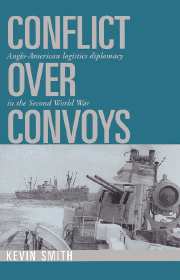Book contents
- Frontmatter
- Contents
- List of maps
- List of tables
- Preface
- List of abbreviations and codewords
- Introduction
- 1 “Not what it could or should be”: Britain's shipping situation
- 2 “Beyond our power without your help”: Britain's Battle of the Atlantic
- 3 “But westward, look, the land is bright”: American shipping assistance from neutrality to belligerency, March 1941–November 1942
- 4 Roosevelt's promise: “your requirements will be met”
- 5 The Casablanca Conference and its aftermath: a “most curious misunderstanding”
- 6 Reaping the whirlwind: the perils of impending victory
- Postscript and conclusions
- Appendices
- Tables
- Notes
- Bibliography
- Index
6 - Reaping the whirlwind: the perils of impending victory
Published online by Cambridge University Press: 06 July 2010
- Frontmatter
- Contents
- List of maps
- List of tables
- Preface
- List of abbreviations and codewords
- Introduction
- 1 “Not what it could or should be”: Britain's shipping situation
- 2 “Beyond our power without your help”: Britain's Battle of the Atlantic
- 3 “But westward, look, the land is bright”: American shipping assistance from neutrality to belligerency, March 1941–November 1942
- 4 Roosevelt's promise: “your requirements will be met”
- 5 The Casablanca Conference and its aftermath: a “most curious misunderstanding”
- 6 Reaping the whirlwind: the perils of impending victory
- Postscript and conclusions
- Appendices
- Tables
- Notes
- Bibliography
- Index
Summary
… we were faced with a very big deficit on U. S. Army account and this deficit could only be met by inroads on the U. K. import programme. The British were still living “soft” and could easily stand further reductions.
General C.P. Gross, 23 May 1943, at TRIDENT Conference… the least said about scorekeeping the better, and let us get down to practical ship owning … [the] squabbling that goes on as to how many 1/2 ships we have against so many 7/8 of a ship … simply drives one crazy, and … will cause us perhaps to overlook the really important things in life.
O. A. Hall of MWT, 6 January 1944Despite the United States Army's intense opposition to aiding British imports at military deployments' expense (exemplified by Gross' judgment in March 1943 that Britain could and must survive with 16 million tons of dry-cargo imports), British efforts to induce American recognition of responsibility for a larger share of Allied merchant shipping requirements and to achieve primacy for British civilian needs had succeeded. Franklin Roosevelt had finally decided in March 1943 to honor his November 1942 pledge. Defeat of the U-boat from May 1943 and the rapid cumulative expansion of American merchant shipbuilding were significant milestones that portended easy fulfillment of this pledge.
- Type
- Chapter
- Information
- Conflict over ConvoysAnglo-American Logistics Diplomacy in the Second World War, pp. 177 - 225Publisher: Cambridge University PressPrint publication year: 1996



